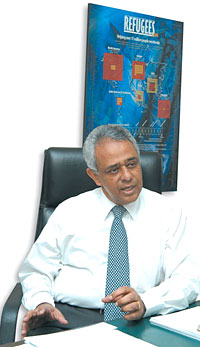 Nepali Times asked the Nepal representative of the United Nations High Commissioner for Refugees (UNHCR), Abraham Abraham if his group is cutting aid to Bhutani refugees.
Nepali Times asked the Nepal representative of the United Nations High Commissioner for Refugees (UNHCR), Abraham Abraham if his group is cutting aid to Bhutani refugees. Nepali Times: Bhutanis say there is a big cut in aid for refugee camps by bilaterals and UNHCR.
Abraham Abraham: I don't know where they get the idea because there is no reduction in the overall level of assistance. This is not something that is decided on an ad hoc basis by my colleagues or me. This is decided at the annual session of the executive committee in Geneva where the levels of assistance are decided for all programs worldwide. There is no effective reduction in the level of assistance. We may shift in the extent that we may support one sector more than another.
There seems to be a communication gap, then.
Not true. We had plenty of sessions informing refugees why we need to reduce a particular area, which perhaps has been traditionally not providing the desired level of output. We need to concentrate on areas where there is more need for funding.
Is it true UNHCR is handing over its responsibilities in the camps to other agencies?
That is not the intention. We don't want to abdicate or give up the mandated responsibilities to bring about the solution. We are trying to bring developmental partners into areas we are working in so they can try and transform some of the relief assistance into a more sustainable developmental type of assistance in order to have continuity. Otherwise we are talking about recurring expenditure year after year when actually that money could be put into better assistance through input from development partners.
The bilateral talks for repatriation to Bhutan are at a dead end. Do you think it's time for trilateral or multilateral talks?
As long as it remains a bilateral process, it will be for the parties in the bilateral process to see whether they would like to involve any other party or not. We would be available to both the governments to provide whatever support they want or maybe looking for.
The Maoist problem has overshadowed the refugee issue in Nepal. Are there concerns?
I don't think that the government is not paying attention. We work with them on a daily basis. The national unit for refugee affairs coordinates a lot of work for this to be done. We have no problems in accessing the government. There is no problem in the lack of government interest. I'm sure that government has a lot of priorities but that does not in any way diminish its interest in refugees neither does it restrict me to go to the government when I need support.
UNHCR is also said to be pushing the Nepal government to agree to local integration.
We recommend that we have to find a comprehensive solution to the problem simply because all refugees can't go back or may not wish to go back. Therefore what do you do with those who are unable to go back? In that context, the UNHCR applies its traditional approach of seeking possibilities for local integration. To that extent we have mentioned this to the government as we do in most cases of protection.
But the government is said to be against it.
The government of course wants to see repatriation of refugees first and to see what other possible solutions there could be such as third country resettlement before it considers local integration.
What is the status of third country resettlement?
We are in dialogue with resettlement countries but they too are waiting for repatriation (to Bhutan) before taking up third country resettlement.
Refugee leaders want India to intervene.
We would like India to play a role but at the same time we can't insist on the kind of role they can play. What we would like is for the two countries to be able to move forward on the issue of repatriation of the refugees. And if there is any difficulty of resuming the dialogue, perhaps it could also help
Are Nepal and Bhutan doing enough?
When you think of 15 years where refugees have been in the camps, I don't think enough is being done. There is need to move forward firmly and with greater commitment and resolve because you can't just keep the refugees in the camps for another undetermined period. This would be both inhuman and criminal.


